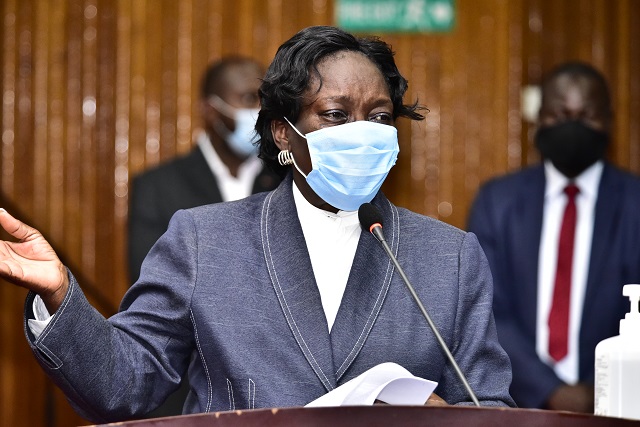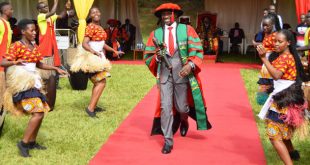
Kampala, Uganda | THE INDEPENDENT | The Clerk to Parliament Adolf Mwesige has directed suspension of expenditure of funds from the account of the Rebecca Alitwala Kadaga Institute of Parliamentary Studies (RAKIPS), citing irregularities and illegalities in the management of funds.
The directive is carried in his letter dated 24th September to the Executive Director of the Institute, Charles Binwe.
The institute attained a semi-autonomous status after the enactment of a law establishing an institute named after the former Speaker of Parliament Rebecca Alitwala Kadaga. The act was gazetted in May last year.
The institute operates as an agency of the government under the supervision and control of the Parliamentary Commission. It among others conducts training of Members of Parliament and staff in Uganda and elsewhere in the world, as well as training of local government officials.
In February this year, former Speaker of Parliament Rebecca Kadaga inaugurated the first board for the Institute of parliamentary studies. The board is chaired by Dokolo Woman MP Cecilia Atim Ogwal and has MPs Anna Adeke Ebaju, former Gulu Municipality MP Lyandro Komakech, Isingiro South MP Alex Byarugaba Bakunda, Justine Niwagaba and Dr. Stella Kyohairwe as members.
Before the enactment of the law, the institute was just an organ created under the Administration of Parliament Act.
“I have received reliable information to the effect that funds disbursed to the RAKIPS in form of subvention are being managed in an illegal and irregular manner. As you might be aware, RAKIPS has no authority to manage a vote of its own within the meaning of the Public Finance Management Act of 2015 (PFMA). The funds being expended by RAKIPS in form of subvention are part and parcel of the budget of the Parliamentary Commission for which the Clerk to Parliament is accountable as the Accounting Officer in accordance with Section 11(2) of the PFMA,” reads part of Mwesige’s letter.
He adds that the RAKIPS Executive Director has been managing the funds of the institute without reference to the Office of the Clerk to Parliament and that it is not surprising that irregularities have been reported in the expenditure of public funds disbursed to the institute inform of subvention by the Commission.
“I am by copy of this letter requesting the Internal Auditor of Parliament to commence an audit of all RAKIPS expenditure from inception to date. I have also initiated consultations with the Accountant General to advise on the propriety of the bank account and mode of expenditure of public funds allocated to RAKIPS,” further reads the letter.
Mwesige also reveals that he has also sought advise from the Attorney General on the harmonisation and/or conflict of laws between the Institute of Parliamentary Studies Act of 2017 and the PFMA, 2015.
He says that the outcome of the consultations will require him to petition the Speaker Jacob Oulanyah, to convene a special meeting of the Parliamentary Commission to consider and take the ultimate position on the operations of RAKIPS in future.
“In the view of the above ongoing consultations, I direct you to suspend expenditure of funds from the account of the Institute until you receive further guidance from the Parliamentary Commission. The Parliamentary Commission is scheduled to convene in mid- October and therefore this brief suspension of funding and activities of the institute will not have adverse effect on the work of the institute,” Mwesige directs.
Section 5 of the Institute of the Parliamentary Studies Act provides that the Parliamentary Commission shall be the overall policy organ of the Institute and shall be responsible for the strategic direction of the Institute.
Mwesige also points out Section 8 of the same Act which provided that the Executive Director is responsible for the sound management of funds and property of the Institute subject to the general supervision of and control of the Parliamentary Commission.
In February, former Speaker Kadaga said that she was optimistic that the quality of debate and leadership skills in Parliament would improve as the institute takes charge to induct the new team of legislators.
Kadaga said that since the institute was facilitated under the Parliamentary Commission as a department, it would continue to be financed under the same arrangement. The institute was also one of the government entities receiving funding from the Democratic Governance Facility (DGF) whose activities government recently sought to be suspended.
Since the financial year 2018/2019, the Institute has trained a total of 40 female committee leaders, inducted 50 newly elected MPs, trained 316 MPs and committee staff, 673 parliamentary staff, trained 14,234 local council leaders, and trained 164 MPs from other parliaments including Kenya, South Sudan, Somalia, Namibia and others.
*****
URN
 The Independent Uganda: You get the Truth we Pay the Price
The Independent Uganda: You get the Truth we Pay the Price


